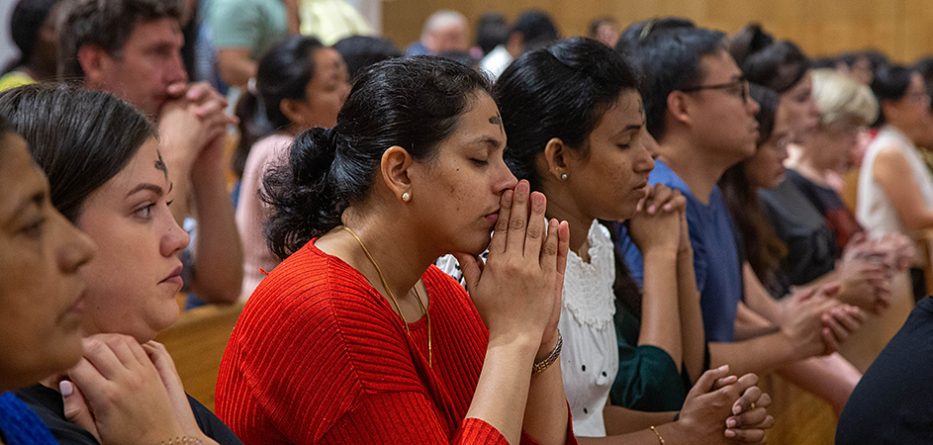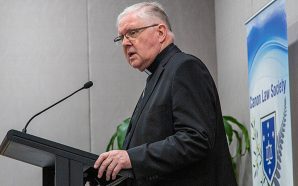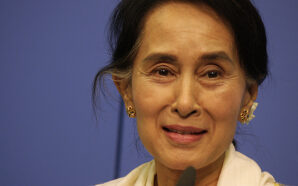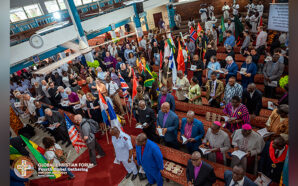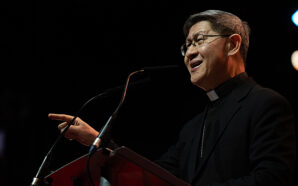Exclusive interview with biblical scholar Anne-Marie Pelletier, member of new papal commission on women deacons
Anne-Marie Pelletier is a biblical scholar with a special expertise on the Song of Songs.
She’s been a papally appointed observer at the Synod of Bishops (2001), was the first woman to win the Ratzinger Prize for theology (2014) and authored the meditations used at the papal-led “Via Crucis” on Good Friday (2017) at Rome’s Colosseum.
Pope Francis, just this past April, appointed the 74-year-old Paris native and mother of three to be a member of his new “Study Commission on the Female Diaconate”.
In an exclusive interview with La Croix‘s Céline Hoyeau, Pelletier said the Church needs to creatively revisit ministries in the Church, beyond presbyteral and diaconal ordination.
La Croix: What does the response to Anne Soupa’s press release announcing her candidacy to be Archbishop of Lyon reveal to you?
Anne-Marie Pelletier: This declaration of candidacy raises some objections.
First, because she ignores the fact that in the Church’s tradition one is called to a position of responsibility; one does not apply for it.
What happens to clergymen has been left out.
Then, because it is not certain that the best way to renew the institution of the Church is to contend for taking over existing roles.
Women must occupy institutional places, certainly, but not necessarily by conquering existing forms of power.
Moreover, the extremism of her announcement offers a good excuse not to take it seriously.
The fact remains that the widespread media attention it’s gained shows that the situation is deadlocked. It is as though provocation is the only way forward.
Is it so outrageous that women aspire to be clerics like others? What can be done so that they can play their role to a greater extent in decision-making? Are priesthood and governance inseparable?
That women could be clerics like others, is it really so outlandish?
If one day they were to accede to the ministerial priesthood – a hypothesis that’s currently excluded – it would have to be in order to live and practice it a little differently.
Otherwise, it’s all about power and competition.
There are many places where women need to be active today in exercising authority and inspiring new governance, such as parish authorities, episcopal councils and the pope’s council. Why not?
Similarly, why not include women in the college of cardinals?
The truth that needs to be heard is that ministerial priesthood cannot be the sole authority to decide on the life and governance of the Church.
If women were already teaching ecclesiology in seminaries, the Church could have another face.
Would the ordination of women deacons allow women to find a better place in the Church?
It would undoubtedly have a strong symbolic value.
But the question is more complex than it seems.
It all depends on the profile of this diaconate, its attributes, its mode of institution.
A lesser version of the male diaconate would only confirm the inequality between men and women.
This is not an illusory risk, since some have a great fear that women are getting too close to the sacrament of Holy Orders.
Moreover, to focus too much on this issue risks obscuring the true extent of the problem.
It is the overall question of ministries in the Church that needs to be reopened, as they affect both sexes and the different states of life.
Women write to me to tell me of their expectations of a real conversion of outlook and mentality, a prerequisite for esteem and equality.
They question their legitimacy to proclaim the Word of God, they ask that credit be given to their experience, that their voice be included in the word of the Magisterium.
Where exactly are we on the question of the diaconate?
In fact, it has consistently been raised – by women, as well as by bishops – since Vatican II and the re-establishment of the permanent diaconate.
The historical work has increased.
In 1997, the International Theological Commission was asked to formulate an opinion.
The general tendency was in favor of women’s diaconate, but it dodged this conclusion.
In 2016, the International Union of Superiors General (UISG) appealed to Pope Francis, who set up a commission to examine the history of the tradition.
The commission agreed on the existence of deaconesses, but disagreed on how they were instituted, whether by ordination or not.
Today the pope is relaunching a new commission, of which I am a member.
Its work, it seems to me, will have to begin with the question of fidelity to tradition.
Is it a static reality, as such a normative one, that we can only repeat? Or are we not being asked for a work of creativity, of aggiornamento (updating), as Father Congar taught?
In the same way, we will certainly have to uphold the present Church, while starting afresh from the needs of the Christian communities, and taking into account the lived realities.
Let us not forget that this commission is an extension of the Synod of Bishops for the Pan-Amazon region, which highlighted the reality of communities deprived of priests, having survived only thanks to Catholic women who are entirely devoted to the faith and the exercise of charity.
It is to be hoped that these communities will receive institutional and sacramental empowerment, and that others may be called for such a ministry confirmed by ordination.
Wouldn’t this clericalize them?
In itself, it is not being clericalized to receive a mandate from the bishop for the service of the ecclesial body.
It all depends on the way in which the mission is carried out.
It is also true that every mission in the Church is susceptible to being affected by this vice that we call “clericalism”.
Its antidote is service as Christ teaches, in contrast to the human way of exercising power.
This isn’t something spontaneously natural to us. Although I believe women are well disposed, and even gifted, for a truly evangelical selflessness.
What do you imagine is required to make this tradition alive?
We should certainly not confine ourselves to what we know from the past.
The woman diaconate was essentially dedicated to the service of women, especially in the celebration of baptism by immersion.
Today, we are in a very different situation, and one that varies from country to country.
This diversity must be taken into account, as must the new conditions of ecclesial life in a country like ours.
The diaconate should allow women to baptize and to celebrate marriages, just as it should allow them to preach.
In the same way, actions that confer grace could be enhanced. For example, when a woman – or a male who is not a priest – hears a confession, even without being able to give absolution.
Sacramental grace is not limited to our seven sacraments alone.
Is the present context of the Church (the crisis of abuse, in particular) conducive to such changes?
It must be a stimulus for in-depth reflection and for institutional changes that must follow.
But the work to be carried out must also be done with the clear awareness that we live in a world where the anthropological question concerns everyone.
The relationship between men and women is being questioned everywhere, and in a way that we should welcome. It must obviously also concern the Church.
This is an opportunity for the Church to engage in a real work of evangelical conversion.
It is an opportunity to find a true inner balance by having the courage to imagine the Church in a different way.
The cause of women is also, quite simply, that of the Church. May neither be a lost cause.
Reproduced with permission of La Croix.




